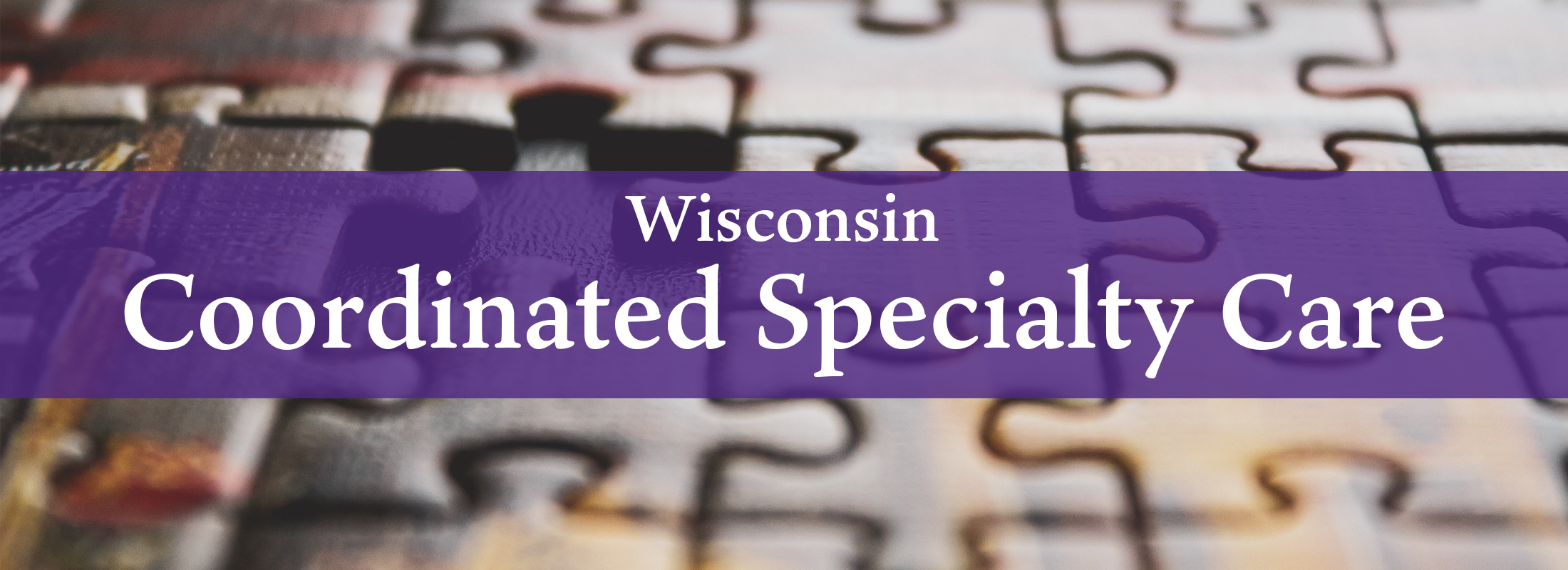CITEE Projects
- About Us
- Sustainability Commitment
- WI-WIOA Career Interview Project
- Coordinated Specialty Care (CSC)
- Employment Connections
- Now Is The Time
- Transition Improvement Grant
- Wisconsin National Core Indicators Project
- Professional Development
- Substance Abuse and Mental Health Services Administration (SAMHSA) Mental Health Awareness Training Grant
- Qualified Treatment Trainee (QTT) Grant Program
- Project SEARCH®
- Wisconsin Integrated Transition Planning Project
- Wisconsin Residential Recovery Trainings
- WI Systems of Care
- Historical Projects
- 4-Step Approach to Treating Co-Occurring Disorders Training
Contact CITEE
Main: 262-472-1702
Coordinated Specialty Care (CSC)
Applications for the Installation Phase are now open. For more information about future grant opportunities, join our mailing list!
Apply Now ≫
About Coordinated Specialty Care (CSC)
Coordinated Specialty Care (CSC) is an evidence-based, early intervention model serving youth and young adults who are experiencing a first episode of psychosis (FEP). They might have unusual thoughts or beliefs, feel fearful or suspicious of others, see or hear things that others do not, or have disorganized thinking. Individuals who receive treatment sooner have better short and long-term outcomes like attainment of goals for school, work, and relationships, reduction in symptoms, reduced use of hospital services, and improved overall quality of life.
How does CSC work?
Using a coordinated team approach, the model emphasizes addressing individual’s unique goals, strengths, needs, and preferences through shared decision-making and a recovery-oriented philosophy. The team works with the young person and their loved ones to develop the best treatment plan based on individual needs, which may include family education and support, medications, supported education and employment, and therapy. CSC clients are enrolled in the program for a limited time (2-5 years). This early intervention offers real hope for clinical and functional recovery.
What is the goal of the CSC Grants Program?
The goal of this Grants Program is to support the expansion of CSC in Wisconsin through a phased implementation approach as outlined below. This funding will provide implementation support and training and technical assistance with the goal of program fidelity by the end of 2025.
How large is the need for Coordinated Specialty Care (CSC)?
The annual incidence rate of psychosis ranges from 15-100 per 100,000 i and up to 272/100,000 for the Medicaid population. ii Those who experience psychosis are at much greater risk for suicide, hospitalization, incarceration, homelessness, and long-term financial and social challenges. The cost to individuals is high, but so is the cost to our systems. The average length of stay at Winnebago 15.6 days and the average charge per discharge is $18,541. iii Coordinated Specialty Care costs about $1,350 per month or $16,200 per year per client. iv
Does CSC already exist in Wisconsin?
Wisconsin currently has three sites: Western Region Recovery and Wellness Consortium led by Dunn County (Buffalo, Burnett, Chippewa, Pepin, Pierce, Polk, Rusk, and Washburn Counties), Milwaukee County, and Journey Mental Health Center in Dane County. CSC is funded with the 10% set aside of the Mental Health Block Grant.

Funding for the Coordinated Specialty Care Grants Program is made possible through the Department of Health Services, SAMHSA CFDA 93.958. The program is administered by DHS/DCTS in coordination with University of Wisconsin – Whitewater’s Center for Inclusive Transition, Education and Employment (CITEE).
Coordinated Specialty Care Q & A
Yes. One important component of CSC is rapid entry into services. Treatment should be initiated within two weeks of referral. A timely initial assessment that engages family members requires clear intake and admission procedures, which will be developed as part of exploration and implementation.
Yes. CSC Partner Agency Awards are intended to provide regional, county, or tribal consortiums or other partnship affilitation types with resources necessary to examine, discuss, and identify pathways and goals to effectively implement a Coordinated Specialty Care program with fidelity.
Eligibility:
- Wisconsin county agencies, agencies from a federally recognized tribe with members in Wisconsin, federally qualified health centers, and mental health organizations
- Expertise in providing care to youth with serious mental illness.
- Strong psychiatric supervision and clinical leadership.
- Designated CSC implementation leader that can allocate at minimum 0.25 FTE.
- Criteria that applicants must have, or show they can develop, include:
- Commitment to hiring individuals with lived experience.
- Wellness, recovery, and resilience orientation.
- Access to inpatient hospital care.
- Linkages with community resources and outreach capabilities.
- Access to a psychiatrist or prescriber who works with clients on issues of medication management, wellness, and side effects.
- Ability to provide quality data.
- Ability to provide services in clients homes, community, and clinic settings.
Priority Criteria:
- Expertise in providing care to youth who are experiencing psychotic illness.
- Existing access to a psychiatrist or prescriber who works with clients on issues of medication management, wellness, and side effects.
- Current Comprehensive Community Services (CCS) or Community Support Program (CSP) provider certified through Division of Quality Assurance.
- Eligible to bill Medicaid for CSC services CSC (look up specific service codes) (for specific staff who can bill- ideal CSC team)
- Tribe, county, or agency that intends to serve a geographic area that does not currently have CSC programming.
The CSC program can be structured based on the unique strengths and needs of the community and organization. Applicants will be able to explore how to maximize resources to meet client needs using strategies such as:
- Combination of tele-health and in-person services
- Services and tasks shared among staff
- Embed CSC services into existing provider networks and mental health services such as CCS or CSC
- Collaborate with other counties, tribes, or agencies
- A hub and spoke model with a central entity serving as the lead and utilizing a combination of local case management, telehealth, and in-person care as needed.

